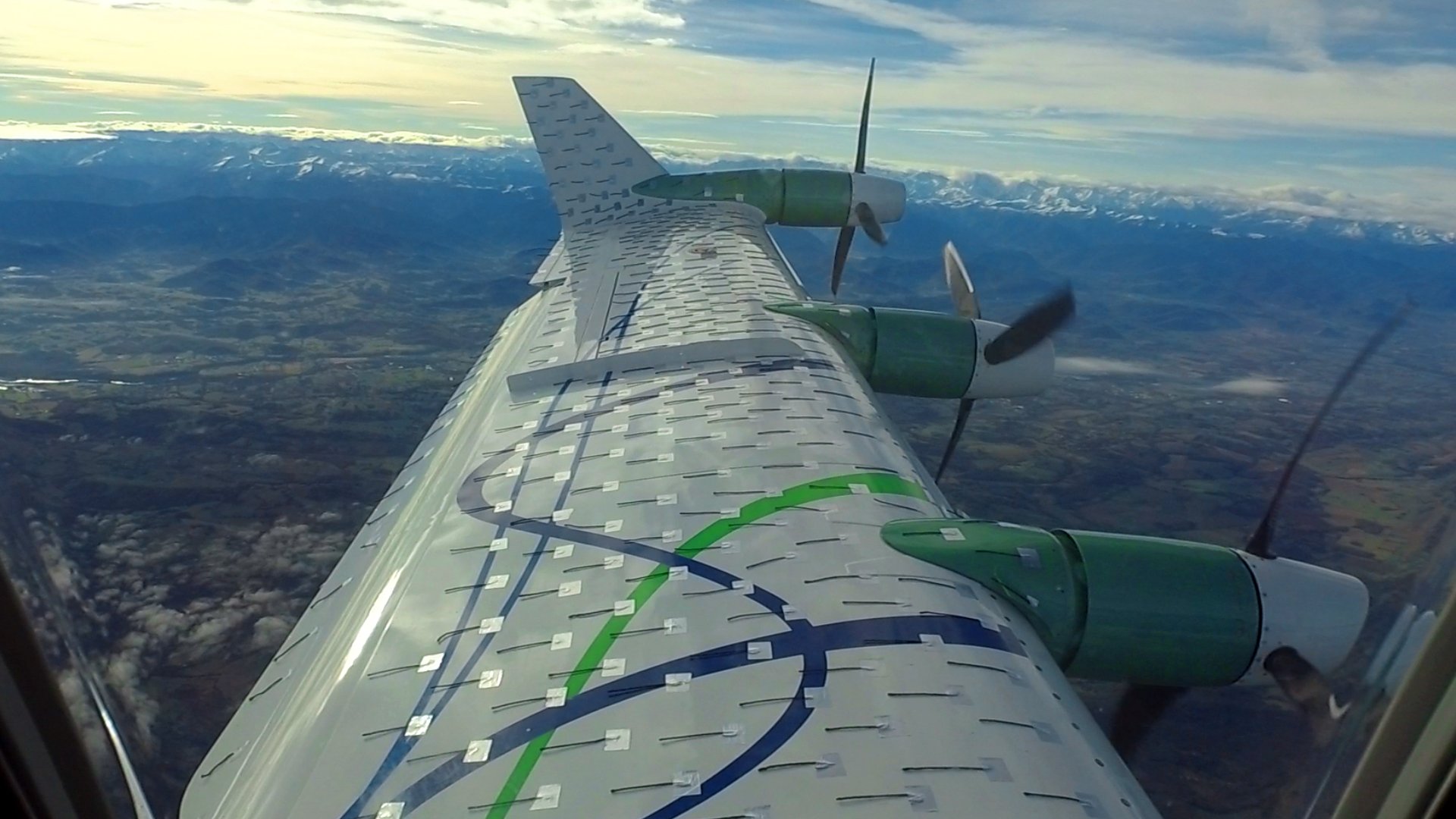EcoPulse Hybrid-electric Technology Demonstrator Makes First Flight
EcoPulse, the hybrid-electric technology demonstrator aircraft being jointly developed by Daher, Safran, and Airbus, has started its flight-test campaign. On December 5, the partners announced that the first flight happened on November 29, with the converted Daher TBM 910 taking off from Tarbes Airport in the southwest of France for a 100-minute sortie.
During the flight, pilots deployed all parts of the powertrain, including the six 50-kilowatt electric power units, the turbogenerator, and six sets of electric thrusters, or “e-propellers,” installed along the wing. The EcoPulse flight tests will validate the results of earlier ground testing and also 10 hours of flight tests that were conducted without the electric propulsion system functioning in May and June. The first test evaluated the flight control computer and high-voltage battery pack.
Safran is responsible for the integrated motor/thruster units, as well as for the turbogenerator, which combines a gas turbine with a generator. The French aircraft engines and systems group has also developed EcoPulse’s power distribution and rectifier unit, which protects the high-voltage network, as well as the power harnesses.
Airbus developed the high-energy-density battery pack, which is rated at 800 volts DC and can deliver 350 kilowatts of power. The European airframer also made aerodynamic and acoustic modifications to the TBM900 testbed aircraft and developed the flight control computer.
Afwerx, NASA, and ResilienX To Develop AAM Digital Operations Center
The U.S. Air Force’s Afwerx research unit has partnered with NASA to create a digital operations center for advanced air mobility services across the U.S., including passenger-carrying eVTOL air taxi flights expected to launch in 2025. They have selected ResilienX, a company that makes traffic management software for uncrewed aerial systems (UAS), to lead an industry consortium that will oversee the development of the new center at Syracuse Hancock International Airport in New York. Syracuse-based ResilienX will build the AAM center in collaboration with the Northeast UAS Airspace Integration Research Alliance (NUAIR), a nonprofit organization dedicated to enabling scalable commercial drone operations in the national airspace system.
“Through a dedicated systems engineering approach, we intend to develop a dual-use solution to the core digital infrastructure needed for advanced air mobility that is inherently scalable and extensible,” said ResilienX CEO Ryan Pleskach. “Through this pioneering effort and with support of all the federal stakeholders that Afwerx is bringing to the table, we believe this solution will be turnkey and available to government and commercial markets in late 2024.”
Flyvbird Signs First Dutch Airport Partner for On-demand Air Taxi Services
German regional airline start-up Flyvbird (Flyv) plans to offer on-demand air taxi services at Twente Airport in the Netherlands. Flyv and Twente Airport have agreed to develop plans to connect Twente to other small airports in Europe using Flyv’s fleet of low-cost and reduced-emissions aircraft, which will include future electric and hybrid models.
The airline has signed provisional sales agreements for up to 100 Electra hybrid eSTOL aircraft and 50 of Eviation's Alice all-electric commuter airplanes. Flyv’s on-demand air taxi network is expected to begin transporting passengers between European cities in 2025, with an initial fleet of four Tecnam P2012 Travellers.
Helibravo and Bluenest Plan Portugal’s First Vertiport Network
Portuguese helicopter operator Helibravo Aviação and vertiport infrastructure specialist Bluenest are teaming up to bring advanced air mobility (AAM) to Portugal. During the AAM Summit in Lisbon in November, the two companies signed an agreement in which they pledged to jointly develop what they say will be Portugal’s first vertiport network. They will also evaluate a strategy for transitioning existing helicopter operations over to new eVTOL aircraft, the first of which could be certified for commercial use in 2025.
“The transition from our current business model with helicopter operations to sustainable mobility and UAM operations of eVTOLs has been our vision as a natural evolution of Helibravo,” said Helibravo Aviação CEO João Bravo. “The strategic collaboration with Bluenest is paramount to ensure our joint mission to populate Portugal with vertiports, ensuring safety, experience, and efficiency in the required infrastructure.”
Bluenest, part of the Spanish transportation infrastructure company Globalvia, is also working with Eve Air Mobility to develop technologies for automating vertiport operations.
Doroni Personal eVTOL Receives Experimental Airworthiness Certification
The FAA has granted Doroni Aerospace special airworthiness certification for its two-seat personal eVTOL aircraft, the Doroni H1, clearing the Florida-based company to begin flying the experimental aircraft in the U.S. national airspace for research and development purposes.
Doroni achieved its first piloted hover flights with a full-scale prototype last summer. The company claims to hold more than 370 preorders for the so-called “flying car,” which it intends to certify under the FAA’s light sport aircraft category in 2024.
